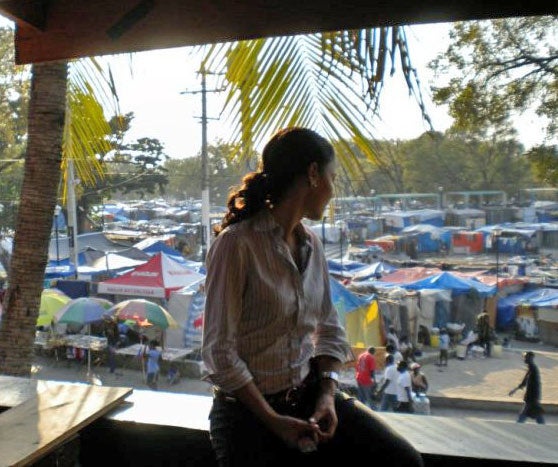How is Haiti? Has it been rebuilt?
Ten years after the catastrophic earthquake struck Haiti’s capital, these are the questions I am most often asked when I state where I am from. The queries are often accompanied by a sympathetic look as the questioner recalls the vivid images of the devastation which were broadcast around the world.
I struggle to respond. How can I condense an answer into a sentence appropriate for polite conversation?
On January 12th, 2010, I was the acting manager of Le Plaza hotel in Port-au-Prince, planning guestroom renovations for the coming Carnival season. At 4.53 p.m. amid screams, the property was enveloped by a cloud of white dust caused by the collapse of neighboring buildings.
Le Plaza was spared severe physical damage, which many believe was a mystical blessing. Another suggested reason was the number of old trees on the property whose deep roots held firmly onto the earth. Or, we simply got lucky.
Within two days of the initial quake, our hotel, centrally located in Port-au-Prince, became a hub for international media. While the property’s balcony was transformed into a platform for global news teams transmitting our story to the world through satellite imagery, ironically, we Haitians were largely cut off from all communication.

Yet, my recollection of the events is as clear as if it was yesterday. When asked to write my thoughts about the earthquake’s 10-year commemoration, I hesitated: The topic conjures up a torrent of feelings: sadness, strength, frustration, gratitude, resistance, love. Where do I even begin?
Since 2010, has Haiti progressed?
Over 300,000 people died in Haiti’s earthquake, rendering it one of the world’s most tragic of the decade. The story we would like to hear is that this impoverished nation has made a remarkable recovery and that the generous international support received has accelerated the country’s economic development. Unfortunately, this is not the case.
Haiti ended the decade on a difficult note: 2019 was marked by political turmoil, people suffered from a lack of opportunity, and many businesses are struggling to survive. Sadly, Haiti is still the poorest country in the Americas, and, as a nation, we are failing.
While many reasons are offered for Haiti’s lack of advancement, the aftermath of the earthquake has also highlighted the flaws of international aid, an issue which often makes donor countries uncomfortable. Aid translates to a disproportionate amount of funds being received by governments, often with imposed conditions. However, when a government is getting more money from outside donors than its local constituents, the social contract generally established between a country’s leaders and civil society is weakened. In Haiti, the lack of government liability coupled with a fragile institutional framework has encouraged corruption over the last decade.
My intent is not to portray all aid programs as inadequate because some were outstanding. Still, I do want to highlight the knotty relationship between Haiti and the western world and the challenges in turning good intentions into positive outcomes.
Haiti has always been a land of contradictions. We are a country forged from the most successful slave rebellion in history, yet we fail miserably at democracy.
So, where are Haitians now?
Living in a state of constant instability makes it hard to have perspective. In Haiti, we operate in survival mode. Yet, while the economic indicators are poor and Haiti often seems far removed from the global economy, a closer look will show some progress.
Over the last decade, Haitians became increasingly aware that durable development will not come solely from the international community.
Despite the weakness of communication infrastructure, appropriate technology is enabling Haitians to have greater access to information and education. Today it is almost impossible to encounter a Haitian in the streets of the capital who doesn’t have a phone, even when his or her next meal is not secured. Social media is helping to shed light on the dark corners of corruption and the vices sucking at the soul of society. But taking control of the country’s destiny and reestablishing trust amongst citizens is still a work in process.
While the waves of international donations and aid programs following the tragedy brought hope to the country, the belief that such sporadic events could stimulate the needed cultural revolution may not have been realistic.
Commemorating the 2010 anniversary
The sheer scale of the disaster meant that Haitians from all walks of life were affected. If you were not hurt, you lost a relative or a friend. In commemorating this day, we recall how fragile life is, how we are connected to each other, and nature. The earthquake, called “goudougoudou” by Haitians, banished all prejudices, and for a short period, we were all the same, working for a common goal. Such feelings need to be held onto and enhanced as we enter a new decade.
Agnès Pierre-Louis is Director at Horwath HTL. A Haitian native, she is now based in Miami and her work focuses on market studies and strategic consulting for hotels, residential real estate and master-planned communities in the United States, Latin America, and the Caribbean. Prior to her role at Horwath HTL, Agnès managed Le Plaza Hotel, a 95-key family property in Haiti and was responsible for relaunching and restructuring the company. While Le Plaza is now managed by her brother, she remains involved as a director. Agnès holds a bachelor’s degree in Hotel and Tourism Management from Ecole Hôtelière de Lausanne, and an MBA from Kellogg School of Management She is fluent in English, French, Spanish and Creole.

